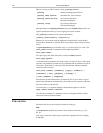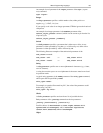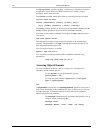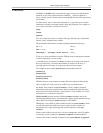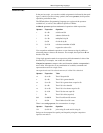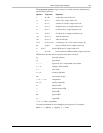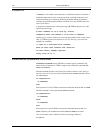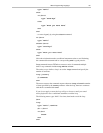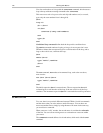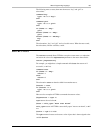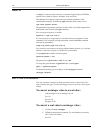
Macro Programming Language 159
FXDeko User’s Guide
The assignment operator assigns a value to a variable, and may simultaneously
perform other operations:
Operator Expression Operation
= $a = $b assigns the value of $b to $a
+= $a += 1 adds 1 to $a, assigns total to $a
-= $a -= 5 subtracts 5 from $a, assigns total to $a
*= $a *= 2 multiplies $a by 2, assigns product to $a
/= $a /= 2 divides $a by 2, assigns quotient to $a
%= $a %= 3 divides $a by 3, assigns remainder to $a
>>= $a >>= 4 shifts $a right 4 bits
<<= $a <<= 4 shifts $a left 4 bits
%%= $a %%= "ok" concatenates “ok” to $a, assigns string to $a
&= $a &= 2 bitwise AND $a and 2, assigns result to $a
|= $a |= 2 bitwise OR $a and 2, assigns result to $a
^= $a ^= $b bitwise exclusive OR $a and $b, assigns result to $a
FXDeko uses the same order of operator precedence used by C:
[] subscript, element
() parentheses
! ~ - logical not, one’s complement, unary minus
* / % multiply, divide, modulo
+ - plus, minus
<< >> left shift, right shift
%% concatenate strings
< <= > >= comparisons
== != equality, inequality
& bitwise AND
^ bitwise exclusive OR
| bitwise OR
&& logical AND
|| logical OR
= += -= etc. assignments
Use nested parentheses to avoid ambiguity in expressions. For example:
$inc = ( ($i+1) * ($j+1) ) / 100




